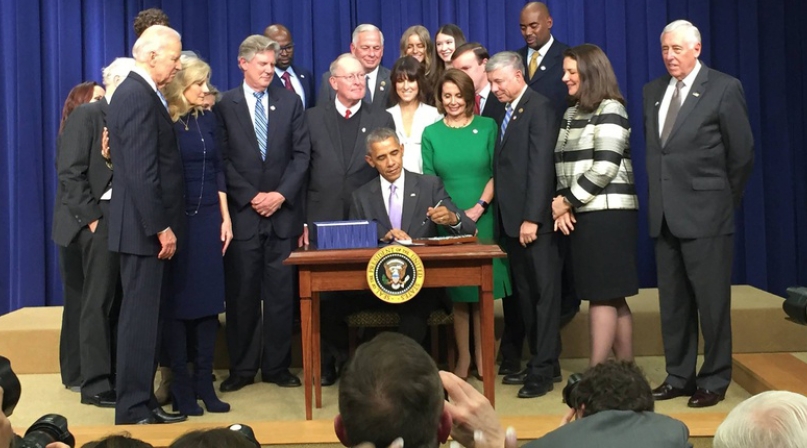Obama signs broad, bipartisan mental health, addiction, justice bill
Upcoming Events
Related News

Addiction, behavioral health aid highlight 21st Century Cures Act
President Obama has signed the 21st Century Cures Act — a massive legislative package that includes provisions related to criminal justice, mental health and addiction services.
The Senate passed the measure, Dec. 7 by a 94–5 vote. The House had passed the bill earlier on Nov. 30 by a vote of 392–26.
Several key provisions in the legislation relate to county priorities, including:
Reducing the number of people with mental illness in jails: By reauthorizing the Mentally Ill Offender Treatment and Crime Reduction Act (MIOTCRA), the bill would support local efforts to decrease mental illness in jails through a broad range of activities, including jail diversion programs, mental health courts, in-jail treatments and transitional services and crisis intervention training. Through the Stepping Up Initiative, counties are working to reduce the estimated 2 million individuals with serious mental illnesses who are admitted to 3,100 local jails each year.
Providing community-based behavioral health services: By reauthorizing the Community Mental Health Services and Substance Abuse Prevention and Treatment block grants, the bill would continue to allow counties, through 750 behavioral health authorities and community providers, to deliver direct behavioral health services to those with mental health conditions and substance abuse disorders.
While provisions to reform the mental health system are weaker than in previous stand-alone bills, the legislation still contains some county priorities for behavioral health reform, including strengthening the behavioral health workforce and enhancing the implementation of mental health parity.
Combating the opioid epidemic: By authorizing $1 billion over two years for state grants to supplement opioid abuse prevention and treatment activities, lawmakers have taken a significant step in efforts to end the opioid epidemic. While this is a positive first step, until Congress appropriates funds for these bills, local opioid programs will not receive additional federal support.
The appropriation of significant funding for local opioid programs was one of the recommendations made to federal leaders in a report recently released by NACo’s Task Force on the Opioid Epidemic, jointly launched this year with the National League of Cities.
While these provisions promise to address long-standing county priorities, NACo has concerns with how Congress plans to pay for the $6.3 billion package.
Over half of the bill ($3.5 billion) would be offset by future cuts to the Department of Health and Human Services Prevention and Public Health Fund (PPHF), which helps more than 1,900 county public health departments protect their residents’ health and safety, and prevent the leading causes of death in their communities.
Federal investments like the PPHF are responsible for approximately one-fourth of local health departments’ revenue, and since 2008, budget cuts have led to the loss of more than 50,000 jobs at local health departments. NACo has long fought to protect the PPHF.
The initial draft of the bill also included the Family First Prevention Services Act (FFPSA), which was stripped from the final “Cures” package passed by the House. This language, which would have updated federal foster care requirements and introduced new federal funding for foster care prevention services, included a few provisions that concerned some NACo members.
Attachments
Related News

White House Executive Order establishes national substance use disorder response
On January 29, the White House issued an Executive Order (EO) establishing the Great American Recovery Initiative, a new federal effort aimed at coordinating a national response to substance use disorder (SUD).

USDA and HHS release new dietary guidelines
On January 7, U.S. Department of Agriculture Secretary Brooke Rollins and U.S. Department of Health and Human Services Secretary Robert F. Kennedy, Jr. unveiled the new Dietary Guidelines for Americans, 2025–2030.

SAMHSA cancels, reinstates thousands of behavioral health grants
Late on Wednesday, January 14, the Administration announced that thousands of Substance Abuse and Mental Health Services Administration (SAMHSA) grants that had been terminated just one day earlier would be reinstated.